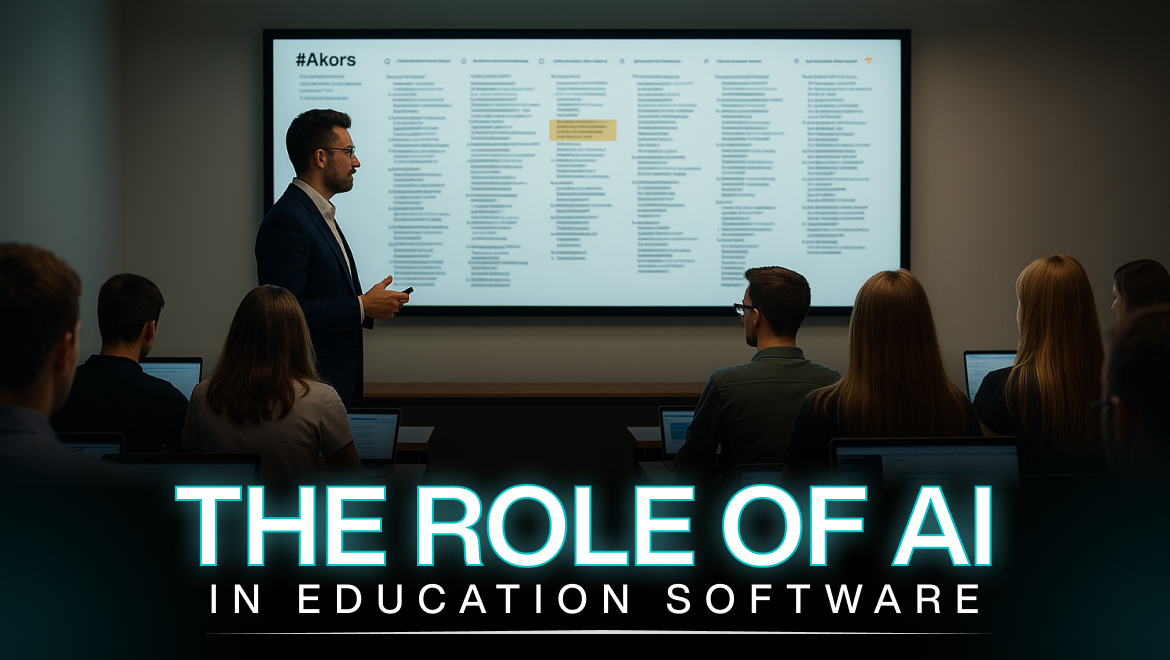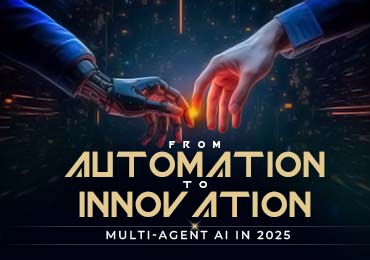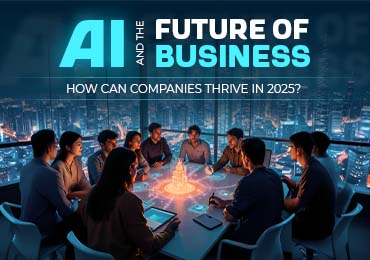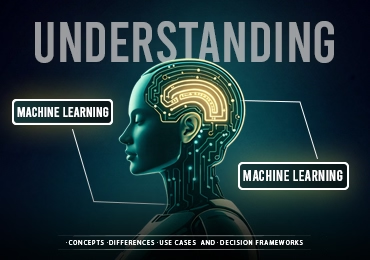

- By ACI
- 04 November, 2025
- 7 min Read
The Role of AI in Education Software: Transforming Learning for a Smarter Future
Artificial Intelligence (AI) is redefining how the world learns. From personalized digital classrooms to intelligent assessment tools, AI is reshaping the foundation of education software. In fact, by 2030, the global AI in education market is projected to surpass $25 billion, with the United States, the United Kingdom, and Brazil leading adoption in institutional learning systems.
For educational institutions and parents alike, AI is not just a technological upgrade—it’s a strategic shift that enhances accessibility, streamlines operations, and improves student outcomes. As education moves into a new digital era, AI has become the bridge between innovation and inclusion.
This article explores how AI is transforming education software, the emerging trends across global markets, and why educational leaders must embrace this evolution to prepare learners for the future.
Understanding AI in Education Software
Artificial Intelligence in education software refers to the integration of intelligent algorithms that mimic human reasoning to enhance how students learn, teachers instruct, and institutions operate.
Unlike conventional systems that simply manage content or attendance, AI-powered education software learns from data, continuously improving its ability to deliver personalized experiences and automate decision-making.
What Does AI Do in Education Software?
AI technologies—such as machine learning, natural language processing (NLP), and predictive analytics—help educational institutions:
- Adapt content based on individual learning pace.
- Automate administrative and grading tasks.
- Generate actionable insights about student performance.
- Facilitate data-driven planning and resource allocation.
In short, AI transforms education software from a static platform into an intelligent ecosystem that continuously evolves with every interaction.
How AI is Transforming the Education Experience
The impact of AI extends far beyond classrooms—it reshapes the entire learning ecosystem. For higher authorities in education, understanding this transformation is critical for strategic planning and innovation adoption.
1. For Educational Institutions
AI enables institutions to manage operations efficiently by automating scheduling, reporting, and compliance tasks. Predictive analytics help forecast student enrollment, optimize staff allocation, and even detect academic risks before they escalate.
2. For Teachers
AI acts as a teaching assistant, simplifying repetitive work like grading assignments and tracking attendance. More importantly, it provides insights into student engagement and progress, allowing teachers to focus on mentorship rather than data entry.
3. For Students
Personalized learning platforms use AI to adapt to each student’s strengths, weaknesses, and preferred learning style. Through AI-driven tutoring systems, students receive real-time feedback, enhancing understanding and long-term retention.
4. For Parents
AI-driven dashboards offer transparency—allowing parents to monitor progress, identify challenges early, and stay connected with educators through automated communication systems.
Together, these applications are redefining the relationship between institutions, educators, and families, building more collaborative and data-driven educational communities.
Major Roles of AI in Modern Education Software
The success of modern education software lies in its ability to think, adapt, and evolve. Here are the primary roles AI plays in transforming today’s learning environments:
1. Personalized Learning at Scale
AI algorithms analyze learner behavior and academic data to create personalized learning paths. Whether a student needs extra practice in mathematics or prefers visual learning methods, AI systems tailor the content to suit their pace and style—something traditional education systems could rarely achieve at scale.
2. Data-Driven Insights & Predictive Analytics
By analyzing historical and real-time data, AI tools can predict academic trends, such as which students are at risk of underperforming or dropping out. Institutions can then intervene proactively, improving student success rates and institutional efficiency.
3. Intelligent Administration & Automation
AI-based automation simplifies complex administrative workflows—from admissions and fee management to grading and reporting—allowing educators and management to focus on strategic initiatives rather than repetitive manual tasks.
4. Enhanced Accessibility & Inclusion
AI supports students with disabilities by providing voice recognition tools, language translation, and adaptive text-to-speech systems. In countries like Brazil, AI is improving access to education for rural and low-income students through localized, low-bandwidth intelligent platforms.
5. Continuous Learning & Institutional Improvement
Through data loops and performance analytics, AI systems constantly refine their algorithms, helping institutions identify what works best and improve their processes for better outcomes.
As AI becomes central to education software, institutions that adopt these technologies early position themselves as leaders in digital transformation and academic innovation.
AI in Education Industry Trends: USA, UK, and Brazil
Each region is experiencing its own AI transformation wave, influenced by local educational priorities, policies, and technology readiness.
United States
U.S. schools and universities are integrating AI within Learning Management Systems (LMS) to automate grading, support remote learning, and improve teacher productivity. Federal initiatives are encouraging responsible AI use to maintain fairness and privacy in education.
United Kingdom
The UK education system is focusing on ethical AI adoption—ensuring transparency in algorithms used for assessment and admissions. Institutions are leveraging AI-driven analytics to support data compliance and enhance equity in learning outcomes.
Brazil
In Brazil, AI is a key enabler of educational inclusion. With a large population of remote learners, AI tools are helping bridge digital gaps by providing low-cost adaptive learning solutions, enabling teachers to monitor progress even in remote regions.
These regional examples highlight a universal truth - AI in education is not just about technology; it’s about creating equitable, efficient, and adaptive learning environments worldwide.
Challenges and Ethical Considerations
Despite its transformative promise, the implementation of AI in education software must be handled with care and responsibility.
Key challenges include:
- Data privacy: Protecting sensitive student data from misuse.
- Algorithmic bias: Ensuring that AI models treat all learners fairly.
- Transparency: Making AI decision-making understandable to educators and parents.
- Overreliance on automation: Maintaining the human element in learning while leveraging AI’s efficiency.
For policymakers and school authorities, developing frameworks for responsible AI in education is critical to ensure innovation does not compromise ethics or equity.
The Future of AI-Driven Education Software
AI in education software is still evolving—but its direction is clear. The next decade will see:
- Predictive learning ecosystems that anticipate student needs.
- AI copilots for educators to automate curriculum design and content updates.
- Voice and image recognition tools for immersive classroom engagement.
- Blockchain-backed credential verification, ensuring academic integrity and secure record keeping.
As generative AI and machine learning mature, education systems will evolve into self-optimizing ecosystems, where learning content, assessments, and administration adapt dynamically to changing needs.
The future of AI in education software is not about replacing educators—it’s about empowering them to deliver more personalized, inclusive, and data-informed education.
Conclusion
Artificial Intelligence has moved from being a futuristic concept to an essential component of modern education. It is transforming every layer of the academic ecosystem—from curriculum design to institutional management—making learning more adaptive, efficient, and human-centered.
As AI continues to shape the future of education, institutions that act early will gain a competitive edge—creating environments where every student can thrive, every educator can focus on teaching, and every decision is informed by intelligence.
At Aryabh Consulting, we understand that the true value of AI lies not in automation alone but in building intelligent systems that serve human potential. By combining domain expertise with innovation, we help educational institutions embrace the power of AI-driven software—securely, responsibly, and effectively.


